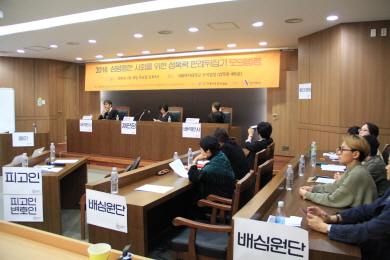
A mock trial was held in Ewha on April 28 based on a real case of sexual violence committed by a head of an entertainment agency in his 40s to a 15-year-old girl. Jointly hosted by Ewha Institute for Gender Law and Korea Sexual Violence Relief Center (KSVRC), the trial proceeded with the purpose of raising awareness of the ongoing real case and the Supreme Court’s sentence itself.
Founded in 1991, KSVRC is a women’s activist organization which aims to reveal the nature of and fight against sexual violence. Along with several projects including gender sensitization training and sexual violence survivor speech contest, the mock trial was planned as a part of the “Break the Supreme Court Precedent for Gender Equality” project.
“We believe that holding such trials with the purpose of breaking the Supreme Court’s decision which aroused several controversies will contribute to extirpating the old and distorted practice of legal decision based on lack of understanding in gender problem,” said a staff at KSVRC who wished to remain anonymous. “The Supreme Court’s decision is important because it has a guiding role for the lower court trials and also is a barometer of the society’s recognition on certain issues.”
The role of prosecutor and defendent lawyer were undertaken by students in Ewha graduate school of Law, and lawyer Lee Myung-sook served as the presiding judge. The KSVRC is planning to hold a discussion session on the results of the mock trial. Futhermore, KSVRC will submit video records of the mock trial to the Supreme Court that is deliberating on the appellate trial.
In 2014, the Supreme Court overturned a ruling by the Seoul High Court, which convicted a man in his 40s of sexually assaulting a girl, then aged 15, several times. The Seoul district court had sentenced him to 12 years in jail on charges of raping the girl. Later, the appellate court adjusted the prison term to nine years. Throughout the lower court trials, the man had argued that their sexual relationship was based on love, which the courts did not accept. However, the Supreme Court said that the girl’s testimony lacked credibility based on the fact that she paid a visit to the man while in custody. The court also cited text messages between the two as evidence that they were in a relationship based on love, just as the man had argued. The case is currently going through appellate court.
Reorganizing the case into a mock trial, the judge and the selected jurors revised the court’s ruling. The jurors pointed out the fact that the girl had visited the man under custody or sending letters does not prove that the sexual relationship was under the girl’s consent and love. Rather, the evidence should be regarded as a result of the man’s coercion and pressure. The judge sentenced the man 12 years in prison.
Students who participated in the trial remarked that it was a meaningful event to look back on the judicial decisions.
“I think it is a reasonable approach of expressing opposition to the court’s decision,” said Jung Gee-won, a sophomore majoring in International Studies.

